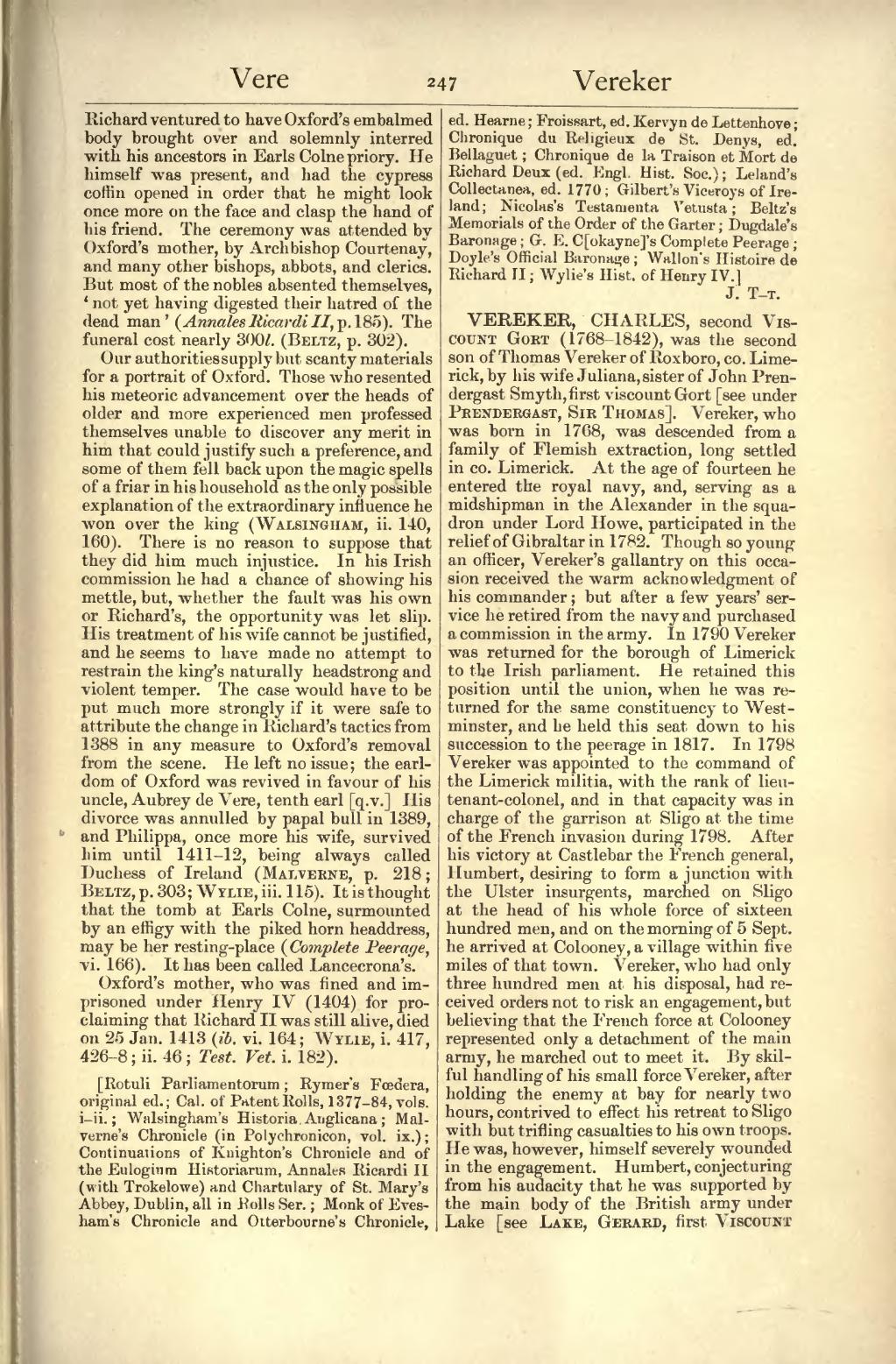Richard ventured to have Oxford's embalmed body brought over and solemnly interred with his ancestors in Earls Colne priory. He himself was present, and had the cypress coffin opened in order that he might look once more on the face and clasp the hand of his friend. The ceremony was attended by Oxford's mother, by Archbishop Courtenay, and many other bishops, abbots, and clerics. But most of the nobles absented themselves, ‘not yet having digested their hatred of the dead man’ (Annales Ricardi II, p. 185). The funeral cost nearly 300l. (Beltz, p. 302).
Our authorities supply but scanty materials for a portrait of Oxford. Those who resented his meteoric advancement over the heads of older and more experienced men professed themselves unable to discover any merit in him that could justify such a preference, and some of them fell back upon the magic spells of a friar in his household as the only possible explanation of the extraordinary influence he won over the king (Walsingham, ii. 140, 160). There is no reason to suppose that they did him much injustice. In his Irish commission he had a chance of showing his mettle, but, whether the fault was his own or Richard's, the opportunity was let slip. His treatment of his wife cannot be justified, and he seems to have made no attempt to restrain the king's naturally headstrong and violent temper. The case would have to be put much more strongly if it were safe to attribute the change in Richard's tactics from 1388 in any measure to Oxford's removal from the scene. He left no issue; the earldom of Oxford was revived in favour of his uncle, Aubrey de Vere, tenth earl [q. v.] His divorce was annulled by papal bull in 1389, and Philippa, once more his wife, survived him until 1411–12, being always called Duchess of Ireland (Malverne, p. 218; Beltz, p. 303; Wylie, iii. 115). It is thought that the tomb at Earls Colne, surmounted by an effigy with the piked horn headdress, may be her resting-place (Complete Peerage, vi. 166). It has been called Lancecrona's.
Oxford's mother, who was fined and imprisoned under Henry IV (1404) for proclaiming that Richard II was still alive, died on 25 Jan. 1413 (ib. vi. 164; Wylie, i. 417, 426–8; ii. 46; Test. Vet. i. 182).
[Rotuli Parliamentorum; Rymer's Fœdera, original ed.; Cal. of Patent Rolls, 1377–84, vols. i–ii.; Walsingham's Historia Anglicana; Malverne's Chronicle (in Polychronicon, vol. ix.); Continuations of Knighton's Chronicle and of the Eulogium Historiarum, Annales Ricardi II (with Trokelowe) and Chartulary of St. Mary's Abbey, Dublin, all in Rolls Ser.; Monk of Evesham's Chronicle and Otterbourne's Chronicle, ed. Hearne; Froissart, ed. Kervyn de Lettenhove; Chronique du Religieux de St. Denys, ed. Bellaguet; Chronique de la Traison et Mort de Richard Deux (ed. Engl. Hist. Soc.); Leland's Collectanea, ed. 1770; Gilbert's Viceroys of Ireland; Nicolas's Testamenta Vetusta; Beltz's Memorials of the Order of the Garter; Dugdale's Baronage; G. E. C[okayne]'s Complete Peerage; Doyle's Official Baronage; Wallon's Histoire de Richard II; Wylie's Hist. of Henry IV.]
VEREKER, CHARLES, second Viscount Gort (1768–1842), was the second son of Thomas Vereker of Roxboro, co. Limerick, by his wife Juliana, sister of John Prendergast Smyth, first viscount Gort [see under Prendergast, Sir Thomas]. Vereker, who was born in 1768, was descended from a family of Flemish extraction, long settled in co. Limerick. At the age of fourteen he entered the royal navy, and, serving as a midshipman in the Alexander in the squadron under Lord Howe, participated in the relief of Gibraltar in 1782. Though so young an officer, Vereker's gallantry on this occasion received the warm acknowledgment of his commander; but after a few years' service he retired from the navy and purchased a commission in the army. In 1790 Vereker was returned for the borough of Limerick to the Irish parliament. He retained this position until the union, when he was returned for the same constituency to Westminster, and he held this seat down to his succession to the peerage in 1817. In 1798 Vereker was appointed to the command of the Limerick militia, with the rank of lieutenant-colonel, and in that capacity was in charge of the garrison at Sligo at the time of the French invasion during 1798. After his victory at Castlebar the French general, Humbert, desiring to form a junction with the Ulster insurgents, marched on Sligo at the head of his whole force of sixteen hundred men, and on the morning of 5 Sept. he arrived at Colooney, a village within five miles of that town. Vereker, who had only three hundred men at his disposal, had received orders not to risk an engagement, but believing that the French force at Colooney represented only a detachment of the main army, he marched out to meet it. By skilful handling of his small force Vereker, after holding the enemy at bay for nearly two hours, contrived to effect his retreat to Sligo with but trifling casualties to his own troops. He was, however, himself severely wounded in the engagement. Humbert, conjecturing from his audacity that he was supported by the main body of the British army under Lake [see Lake, Gerard, first Viscount
